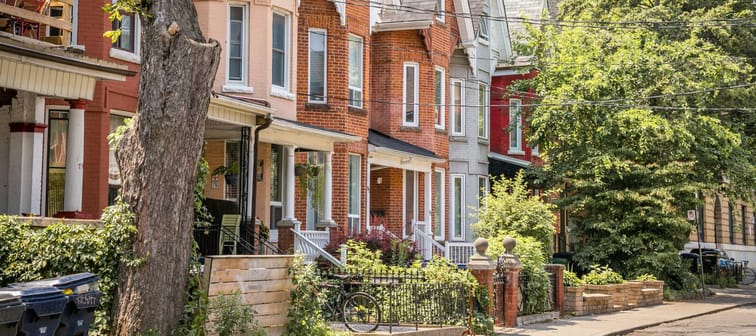Choosing a 3-year mortgage term
Mortgage terms in Canada can vary from six months to 10 years. While three-year terms aren’t the most common of the bunch, they are chosen by 20% of borrowers, according to the Canadian Association of Accredited Mortgage Professionals, and can offer a range of benefits. With all the recent prime rate hikes, short-term mortgages have become more popular. According to the Canada Mortgage and Housing Corporation, three-year mortgages have increaed in popularity since September 2022. A higher percentage of new mortgages or renewals are now under the five-year mark, increasing to over 25% in January 2023 from around 15% in January 2022.
One of the most appealing aspects of a shorter loan term like a three-year is the flexibility it offers.
A three-year term doesn’t require you to make a long-term commitment, so if your financial situation changes you won’t be shackled to your repayment plan for long.
“The biggest advantage of a three-year to the consumer is a shorter timeline in case they don’t know what their long-term strategy is with their mortgage going forward,” says Frances Hinojosa, managing partner at Tribe Financial. “It gives them a safety net of knowing, at a very good interest rate, that they could pause at [the three-year] point and reconsider their options.”
Three-year loan terms usually come attached to lower interest rates — which sounds great at first, but not so much once you consider why that is.
Lenders offer lower rates on shorter-term mortgages as a way of balancing out the risk of having your rate rise after only three years. With a five- or 10-year mortgage term, you have years’ worth of extra predictability baked into your loan. With a three-year term, though, you could be looking at a rate hike much sooner — especially when mortgage rates are climbing as steadily as they are today.
More: What is an interest-only mortgage?
How much home can you afford?
Whether you're hunting for a new home or looking to refinance your mortgage, knowing how much your new loan might cost you is critical. Use our handy mortgage calculator to help you understand what your payments could look like.
Get StartedChoosing a 5-year mortgage term
The five-year fixed rate mortgage is the granddaddy of mortgages in Canada. It’s the product that gets the biggest push from the biggest banks and, because of that, it’s the loan term most borrowers gravitate toward.
You’ll generally pay a higher interest rate on a five-year term than you will on a three-year. That’s the trade-off for having an extra two years of stability. The predictability of knowing what your mortgage payment will be for the next 60 months can be pretty enticing for homeowners on a budget, and may be worth sacrificing a few basis points on your mortgage rate. One basis point is one-hundredth of 1%.
“It’s a good, middle-of-the-road long-term-rate hold,” Hinojosa says.
Stability is something your lender will also be looking for when they approve your loan. They’re banking — pun intended — on collecting five years worth of interest from you, so if you break your agreement and pay off your mortgage early, expect to feel some pain.
Weighing the risks before you sign your mortgage
This is one of the biggest risks of agreeing to a five-year mortgage. If your plans unexpectedly change and you need to sell your home, transfer your mortgage or break your mortgage contract before your loan term has expired, you could be on the hook for a colossal prepayment penalty.
Your prepayment penalty will either be three months of interest on the amount you still owe or what is known as the interest rate differential (IRD), a rather complex calculation your lender will base on multiple interest rates. Let’s just say that the IRD is usually much larger — by thousands — and that lenders almost always ask for the IRD amount.
One homeowner who recently broke a five-year fixed rate mortgage with CIBC had to pay over $47,000 in pre-payment fees. Hinojosa once encountered a prepayment fee of $280,000. That mortgage was in the millions, but the lesson’s the same for any loan amount.
“Know the features, know the cost,” Hinojosa says. “And ensure that it’s something that, if you’re going into for five years at a fixed rate, you are staying committed to.”
As Canada's major banks have raised their mortgage rates of late, you may want to move fast to secure a favourable rate if this is the term you're after.
Picking a 10-year term in Canada
A choice for approximately 5% of Canadian homeowners, the 10-year mortgage term isn’t going to win any popularity contests. But when you’re weighing your options, it’s worth taking a few minutes to ensure you’re getting their full heft.
A 10-year mortgage term is a relatively safe choice if you have no plans to move or sell for an extended period of time. The peace of mind that comes from knowing your mortgage payments won’t increase for a full decade is considerable, and something five- and three-year mortgage holders don’t have access to. That’s why they’ll cost you more in interest.
But 10 years, even for homeowners who have zero intention of disrupting their current, comfy lifestyles, is a long time to plan for.
“No one has a crystal ball,” Hinojosa says. “Life happens, and you never know what’s around the corner."
Breaking a fixed-rate 10-year mortgage after the first five years will cost you three months of interest, but breaking it in the first five years could trigger a massive prepayment penalty that dwarfs those associated with five-year terms.
“The times that I have seen clients take 10-year terms where it made sense were investment properties where there is a 10-year option, because then you’re going to have stability of cost versus income coming in for that long-term hold,” Hinojosa says.
Canada’s top credit cards—find your perfect match!
Maximize rewards, save on interest, or earn cash back. Compare the best credit cards in Canada and pick the one that works for you!
Find Your Card NowNext steps in your mortgage journey
Once you’ve determined which mortgage term is best for your financial needs, you’ll be better prepared to compare what lenders are offering, not only in terms of mortgage rates, but also in terms of the additional fees and conditions that will determine the ultimate cost of your mortgage.
“Chase the solutions, not the cost,” Hinojosa advises, “because that’s where you’re going to have the most savings in the long run.”
When you've decided what type of mortgage works best for you, compare rates and loan offers from multiple lenders.
And the better your credit score the better your rate. Anything above 760 is excellent. Today, it's easy to check your credit score for free online.
More: Know how prime rate has an impact on mortgage rates
You're 5 minutes away from the best mortgage
Searching for your perfect mortgage shouldn’t be hard. Homewise is an online brokerage that will negotiate on your behalf with more than 30 big banks and other lenders, completely free, and it only takes five minutes to apply.
If you're in the market for a new mortgage, or if you're looking to refinance before interest rates rise again, go to Homewise now and answer a few simple questions to get started.









